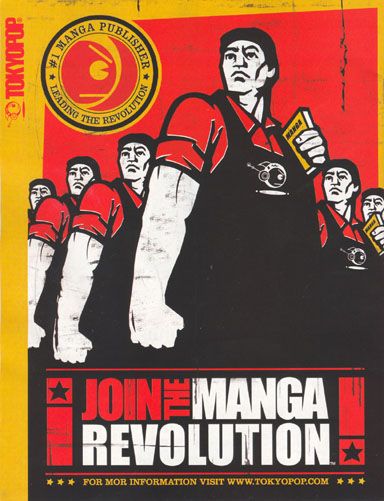Today's news that Tokyopop is shutting down its publishing division, is shocking but not surprising: shocking because Tokyopop was once the second largest manga publisher in the U.S., but not entirely unexpected after they laid off all but a handful of employees last month. The closure raises the question of whether Tokyopop will return the rights to its global manga properties to the creators or keep them in their current limbo. Adding to the confusion is the fact that Tokyopop Media LLC, the non-book side of the company, is not shutting down.
Tokyopop CEO Stu Levy, who is currently in Japan, posted a farewell message on the Tokyopop website today, and Anime News Network confirmed the news with senior vice president Mike Kiley.
Tokyopop pioneered the format that caused manga to catch on among teen readers: Unflipped, 200-page, black-and-white trade paperbacks selling for ten dollars each. They published Sailor Moon, the first commercially successful shoujo manga in the U.S., and kept the momentum going with popular series such as Fruits Basket (which ran neck and neck with Naruto in the sales rankings for a while) and their manga adaptations of Erin Hunter's Warriors prose novels. Unfortunately, when Fruits Basket ended, Tokyopop was left without a flagship series, and they lost rights to many of their other popular series when Kodansha pulled their licenses in preparation for starting its own U.S. publishing arm.
Tokyopop also pioneered the notion of "global" (non-Japanese) manga, not only in the U.S. but also in Germany. (Tokyopop Germany is not closing down.) The global manga program gave many young U.S. creators an intial boost, but the books did not sell well and Tokyopop ended up shutting the program down—but kept the rights to the manga, including some completed projects that never saw print. This has caused some bitterness among creators, who would like to continue or republish their stories but can't because they don't own the rights (which, to be fair, they knowingly signed away).
Back in June 2008, when Tokyopop had its first major shakeout, the company split in two, with COO John Parker taking over the publishing end, Tokyopop Inc., and Levy and Kiley heading up Tokyopop Media LLC. It's my understanding that the latter company holds the rights to their global manga, and it is not closing up shop.
What does this mean for creators? It could end up being a good news/bad news situation. With no publishing division, Tokyopop has zero incentive to hold on to print rights to the global manga. The story I keep hearing is that what Stu and his crew really want to do is develop the comics into media properties, with Stu at the helm. Obviously, this is what Toyopop Media is all about, but with the publishing division gone, it may make sense to allow the creators to get their print rights back, because then they would have an incentive to promote the properties. On the other hand, Levy and Kiley clearly still intend to continue their efforts to turn these stories into something other than print comics, so they are likely to hold on to the other rights. (The sole Tokyopop movie so far is Priest, which is due out this summer after a series of delays.)
Only a handful of global manga properties have stayed in print, most notably Brandon Graham's King City, which was picked up by Image. The word on the street was that a lot of the global manga creators were talking to Image when the line was discontinued, but most of them couldn't get their rights back so the books just disappeared.
As for Levy, he doesn't seem to be interested in staying in the publishing biz. He posted at his Greatest American Otaku blog that he will be staying in Japan for a year to make a documentary about the earthquake and how the Japanese have all pulled together to recover from it. (Levy was in Japan at the time of the earthquake and volunteered to drive supplies to orphans in stricken areas; the experience seems to have made a big impact on him.)
The question is, will he let the people who are interested in publishing (and promoting) their comics have the freedom to do so?


